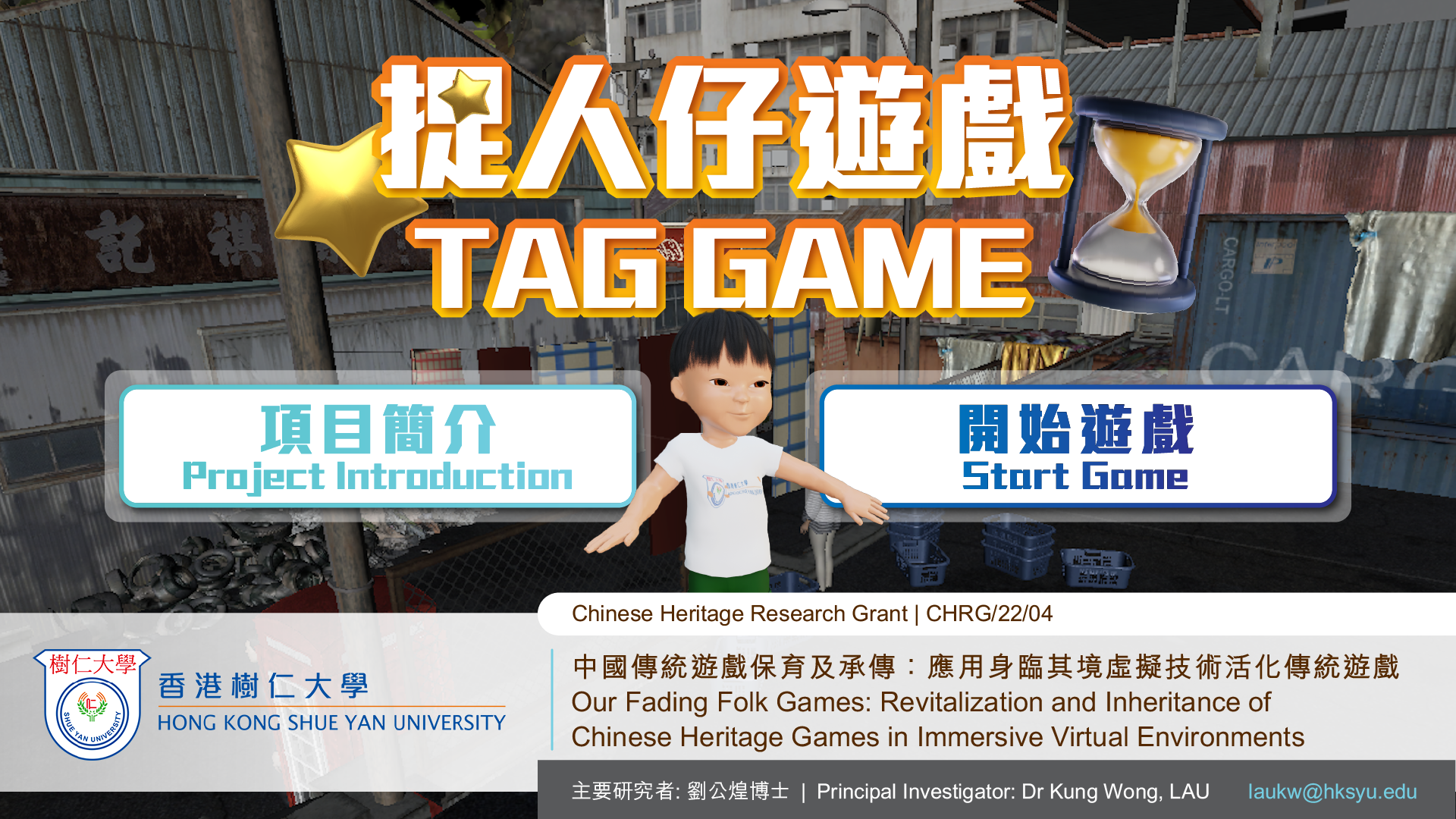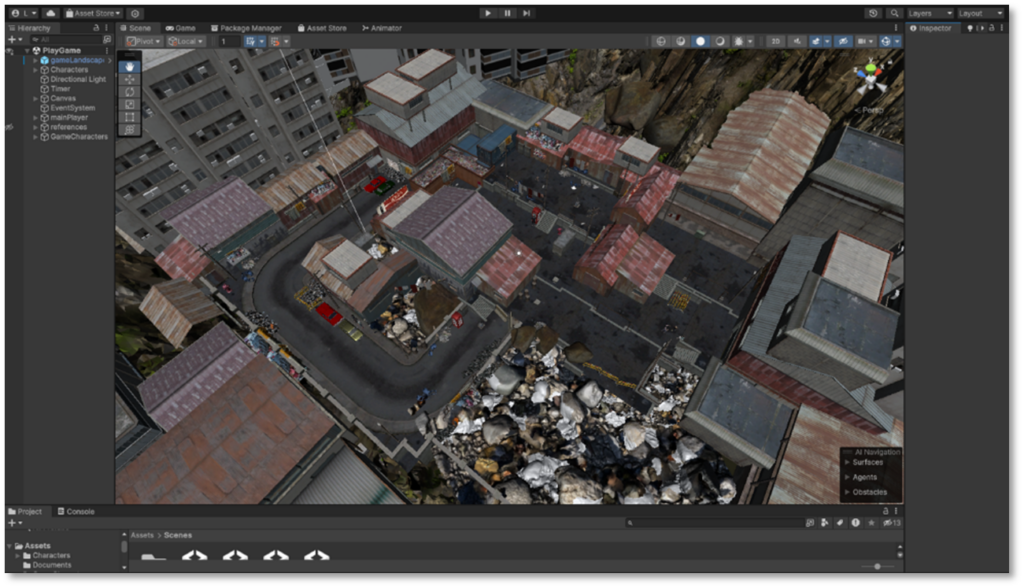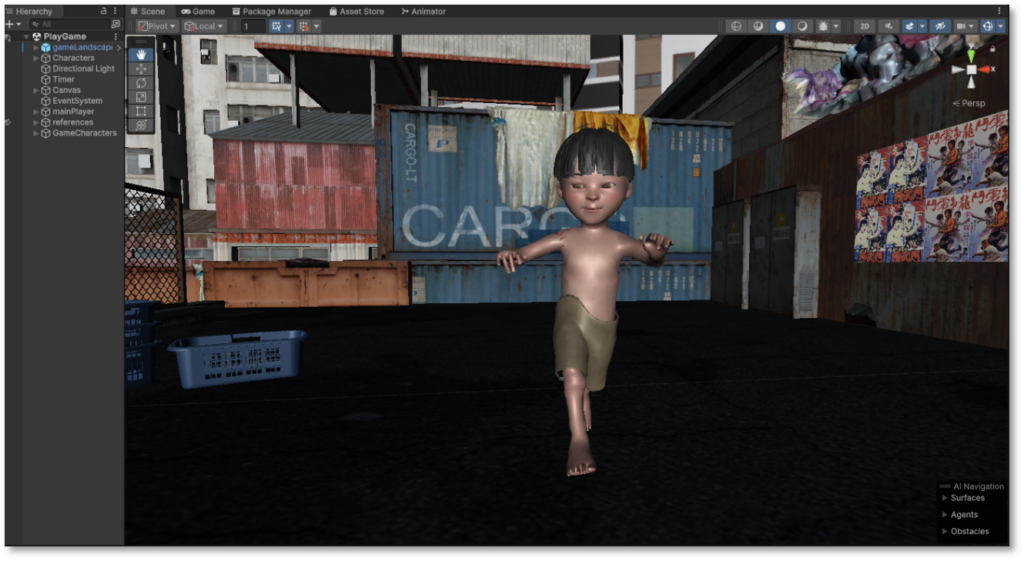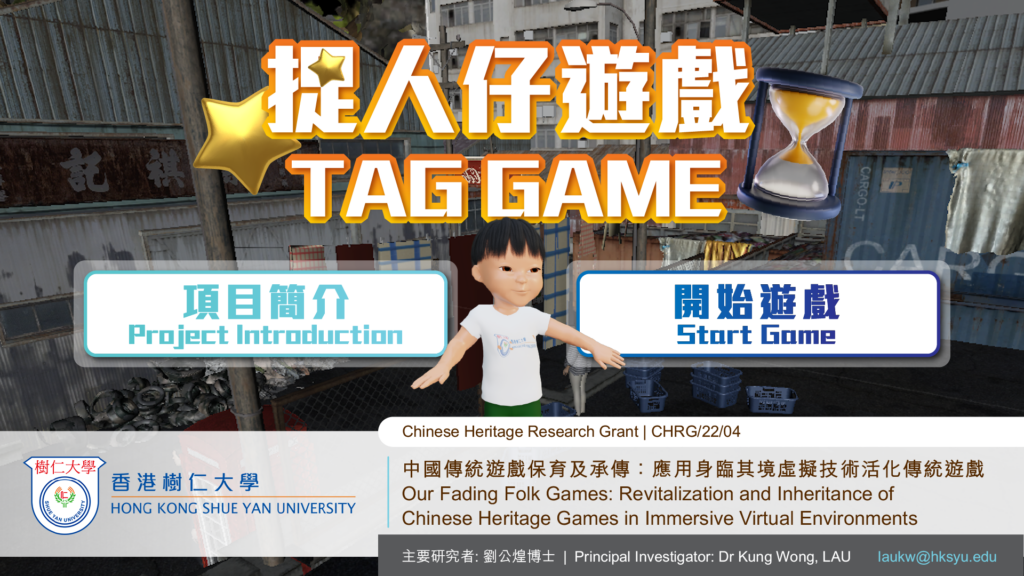
Chinese Heritage Research Grant – Tag Game
Chinese Heritage Research Grant – Tag Game
Research Results Visual Essay
Chinese Heritage Research Grant
Our Fading Folk Games: Revitalization and Inheritance of Chinese Heritage Games in Immersive Virtual Environments
Project Code: CHRG/22/04
中國傳統遊戲保育及承傳:應用身臨其境虛擬技術活化傳統遊戲
The Project Team
Principal Investigator (PI): Prof. Kung Wong LAU
Research Assistant (RA): Ms. Laetitia WONG
Host: Department of Applied Data Science, The Hong Kong Shue Yan University
Acknowledgements: We extend our sincere gratitude for the technical support provided by the Virtual Reality. Special thanks are due to colleagues Mr. Benz Sze and Mr. Yves Liu for their invaluable contributions to the success of this project.
Abstract
Gameplay is one of the essential components of our culture and heritage. It brings collective memories and the formation of social networking within a particular time frame. This research explores the feasibility of preserving and revitalizing heritage game-play activities through the use of virtual reality (VR). The study aims to consolidate and clarify heritage games as a distinct field of study within the VR context. Historical research is applied to identify key heritage games and corresponding gameplay experiences, as reported by local elderly participants. A Chinese heritage game titled “Tag Game” was designed and produced for a post-experiment usability study that aimed to evaluate the elderly’s overall gameplay experience and provide insights for future development in heritage gaming. The findings revealed a strong positive correlation between game challenge design and user enjoyment. Crucially, the sense of presence and immersive experience emerged as a crucial factor in enhancing overall gaming satisfaction among elderly players. The research team suggests that heritage game design should be informed by comprehensive historical and cultural studies to ensure the successful integration of these experiential elements. Focusing on participants’ cultural memories can foster a more diverse heritage discourse and consolidate heritage games as a distinct research field.
Visual Essay
Our new generations have become tech-obsessed with digital gaming. Most of our childhood games are fading out as the older generation passes on. Gameplay is one of the essential components of our culture and heritage. It brings collective memories and the formation of social networking within a particular time frame. These games also shape the beliefs, values, and personality of our older society. The childhood games, for instance, the tag game, peaceful war, the paper fortune teller, the hamburger, the cat’s cradle and the shoot, are fading out and eventually will disappear in our local culture unfortunately. Although we still occasionally “hear” these games in our precursors’ conversations, and see those artefacts from historical museums, the actual game experiences and the intangible fun of play would not be able to revitalize. It is important to note that these aforesaid games are archived by some means, the research team is expected many heritage games are missing and being forgotten. Game-play activities are indeed a part of culture and heritage, therefore, from the academic and educational perspectives, there is current research studying the historical folk games, for instance, studying the traditional serious games in order to find out their origins (Alvarez, Jessel and Rampnoux, 2011), and how the traditional Chinese games could possibly cultivating our new generations (Lee, 2021). Likewise, Yuechuan and Kaizuan (2021) investigate and analyse the traditional Chinese games in particular the “flight” cultural elements within them. Although this academic research provides the new generations with “what” and “how” our heritage games are, the actual experience of game-play is not replaceable.
This research project aims to study the feasibility of archiving, preserving, and revitalizing local heritage gameplay activities through the use of virtual reality (VR) technology. The study is specifically designed to consolidate and clarify heritage games as a distinct field of study within the context of VR. The first phase of this study involved historical research and interviews to identify key heritage games and their corresponding gameplay experiences, as reported by local elderly participants. Based on the data gathered, the research team designed and produced a Chinese heritage game titled “Tag Game” (See Fig. 1). The designed digital game in virtual reality (Tag Game) was sent to the interviewees for user experience research. Data was gathered from 15 respondents (elderly) from local communities by using the Oculus Head-Mount Display system. This post-experiment usability study was then conducted with the elderly participants to evaluate their overall game-play experience in five factors, and provide insights for future development in the heritage games domain. The findings of this study revealed a strong positive correlation between game challenge design and user enjoyment.


Fig.1
Crucially, the sense of presence and immersive experience emerged as a crucial factor in enhancing the overall gaming experience and satisfaction among elderly players. Interestingly, the specific Oculus Head-mount display operation system did not have a significant impact on the elderly participants’ overall gaming experience. The qualitative feedback further underscored the importance of deliberately designing for a strong sense of presence and immersive experience, as this factor was closely tied to the participants’ childhood memories and cultural heritage.
The research team suggests that future heritage game design should be informed by comprehensive historical and cultural studies to ensure the successful integration of these crucial experiential elements. The heritage game design should focus on participants’ cultural memories, it echoes the prior studies (Nylund et al., 2019; Child, 1983) that call for incorporating player and community and social-cultural involvement to foster a more diverse heritage discourse. This approach can contribute to the consolidation and clarification of heritage games as a distinct field of study within the VR context.
To conclude, this project explores and preserves heritage gameplay activities in VR, aiming to have a long-term impact on individual citizens, academic and scholarly activities, as well as society and the community. The revitalized heritage game in VR will serve as a hub, connecting citizens across diverse generations. The elderly can virtually experience the fading games of their childhood, while new generations are given the chance to understand and engage with this cultural heritage. This study is also expected to enhance individual quality of life, cultural awareness, and family bonds. Furthermore, the study of using VR in heritage conservation will contribute new knowledge to academic domains, potentially triggering further discussions and advancements in the field.
References
Alvarez. J., Jessel, J. and Rampnoux, O. (2011). Origins of Serious Games, In M. Ma, A. Oikonomou, and L. C. Jain (Eds). Serious Games and Edutainment Application (pp. 25-43), London: Springer.
Child, E. (1983). Play and Culture: A study of English and Asian children, Leisure Studies, 2(2), 169-186. DOI: 10.1080/02614368300390131
Nylund, N., Prax, P. and Sotaaa, O. (2019). Rethinking Game Heritage – Towards Reflexivity in Game Preservation, International Journal of Heritage Studies, 27(3), 268-280.
Yuechuan, S. and Kaizuan, B. (2021). The Research on “Fight” Culture in Chinese Traditional Games, Communication and Linguistics studies, 7(2): 38-43.
Conclusion and Implications
This research successfully identified and interviewed respondents who provided valuable insights, enabling the research team to gather essential information for both the development of IVEs and the revitalization of missing data primarily sourced from photographs and official archives. Through this historical inquiry, the research team was able not only to simulate and recreate the faded playground but also to gain a deeper understanding of its historical usage for gameplay activities. The proposed use of IVEs offers a novel approach to preserving and revitalizing these fading memories, enabling dynamic interactions with the past that traditional methods cannot facilitate. This framework serves as evidence for future studies and projects related to cultural heritage preservation.
The implications of this approach are twofold. First, it advocates for the incorporation of historical research prior to the design and implementation of simulated IVEs, engaging academics, cultural institutions, and community members in the process. Such collaboration can foster a sense of ownership and pride in the revitalization of historical scenes and activities, thereby promoting their relevance in contemporary society. Second, the application of IVEs can significantly enhance accessibility, allowing a wider audience to engage with Hong Kong’s rich history, irrespective of geographical constraints.


